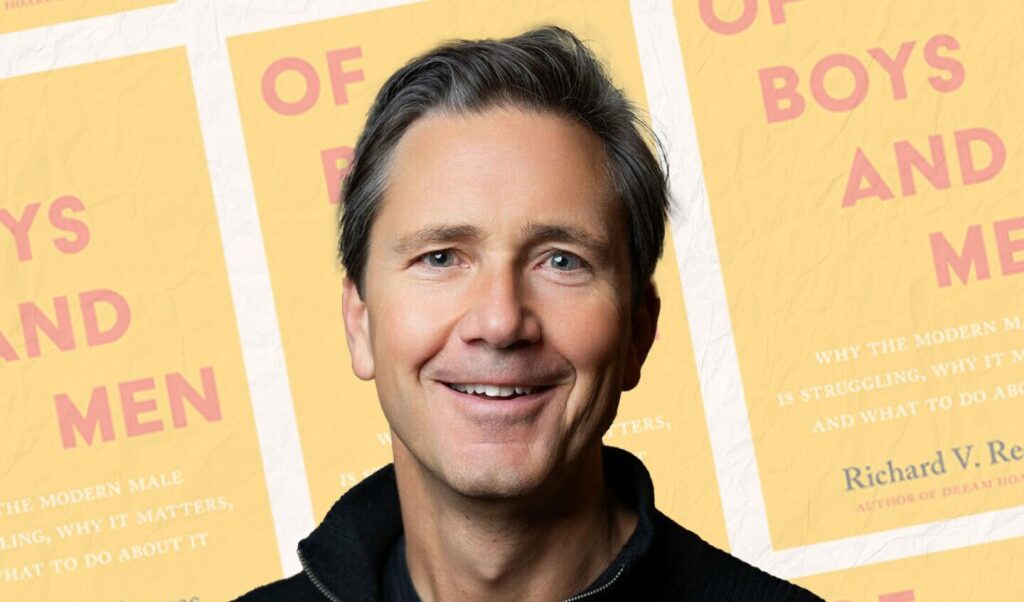If you purchase an independently reviewed product or service through a link on our website, SheKnows may receive an affiliate commission.
Ever since the 2022 publication of his book Of Boys and Men: Why the Modern Male Is Struggling, Why It Matters, and What to Do About It, Richard Reeves has become a preeminent voice for America’s young men. He was one of the first experts we talked to this past year when we launched our Be a Man project and our special digital issue exploring the lives of teen boys, and he helped shed light on the then-emerging “countercultural” rightward lean of young Gen Z men — a topic that proved prescient, to say the least.
Post-election, as Donald Trump takes office and the “bro-tocracy” takes center stage, we caught up with Reeves once more to talk about about why Republicans appealed to young men, why parents need to be listening, and what it means for the future.
SheKnows: When we spoke before the election, you talked about young men feeling “politically homeless.” Post-election, can we assume that young men have found their political home?
Richard Reeves: Well, I think that they found a political halfway house, perhaps not a home. Let’s see what happens. Clearly, we saw a lot of young men moving to the right. One of the surprises, perhaps, was that there was decent turnout among young men. I think one of the questions was going to be not just, ‘What did young men think?’ but would they actually vote? It does look like they did.
My sense is that this was as much a turning away from the left among young men as it was an enthusiastic embrace of the right. The way I said homeless was, I felt like a lot of young men were saying, ‘I just don’t see anything for me from the Democrats right now.’ … And then as we got towards the end of the campaign — and particularly as the Republicans did a lot more podcast appearances — you heard a lot of young men saying that they were really influenced by Donald Trump on Joe Rogan [and] they just thought they’d seen enough from the right to think, ‘Yeah, I’m going to give this guy a go.’
But I don’t think it actually tells us all that much about what’s going to happen four years from now. We’re in a moment, politically now, where it’s a bit more like the kaleidoscope has been shaken. They’ve landed a particular way this time, in 2024, but if we’ve learned anything, it’s that we should not assume that that’s going to hold again in 2028. I don’t think what we’ve seen is young men deciding, ‘Okay, from now on and henceforth, I’m voting Republican.’ I think it was just in this particular moment, the Republican pitch to them was more resonant.
SK: The rightward lean that we’ve been discussing was pretty well documented. Why do you think it came as such a surprise — the ‘bro vote’?
RR: I think it’s probably because it was such a clear victory for the Republicans and for Donald Trump. It’s one thing to be talking about the polls. It’s one thing to [talk about] what might happen, and then something actually did happen. And I think it’s perfectly possible that even if we’d seen the same swing among men — especially young men — that we did see, but that there’d been sufficient support among women, including young women on the other side, and that that had actually got the Democrats over the winning line, there wouldn’t be as much discussion of this.
I think the reason why the issue about young men got so much attention was because the swing was so much greater than among other groups, and also because it then taps into this sense of, was it a misogyny vote? Was it an anti-women vote? There was some performative masculinity on the right, and so there was a kind of fear that this signaled something deeper and perhaps more disturbing in the minds of young men — which I don’t think is true, but I do think they tapped into a fear that some people had about what the election meant for the country.
SK: Can you expand on that? I think there are a lot of left-leaning parents who have worked very hard to raise boys who believe in equality and women’s rights and feminism, and it’s hard not to feel concerned right now on some level.
RR: Ezra Klein had this very nice line after the election where he said, ‘It’s important to react with curiosity rather than contempt.’ And I was just with a very progressive state legislator, a Black woman whose son voted for Trump, and that caused some interesting conversations in their house, but she approached it with curiosity. LIke, ‘Well, why?’ I was very impressed by the way she’d reacted to it.
I think two things can be true: One is that there’s a perfectly good reason why many women in particular are having quite a strong, visceral reaction to the shifting votes of some men, but at the same time [we need] to dig a bit deeper and say, ‘Well, okay, what is that really about? Does it signal this reactionary turn among those men?’ I don’t think it does. The danger is that that would become something of a self-fulfilling prophecy. I fear that if the conclusion that people draw about why men — especially young men — voted that way is because they are sexist, they’re misogynists… then that will actually lead to further pushing those men away.
If you look at the evidence for, what are young men’s views on most of the issues that most of these mums you’re talking about probably care about — well, they’re probably pretty similar. Young men are about as pro-choice as young women, for example, and they thought the Democrats were much better on that issue. They just didn’t vote on that issue.
I don’t see, in the broader evidence, much sign of a huge reactionary swing among young men. I can see why people are afraid of that. But I think it’s very important to look at the data, and for us to just give it a little bit of time, have some grace, and figure out what’s been really going on here. I fear that if the Democrats at a political level, or moms at the personal level that you’ve just mentioned, jump to the conclusion that the only reason, or even the main reason, why young men or a particular young man may have voted for Donald Trump is because they are sexist, that will probably drive that young man further away, and is probably not true, and so it’s just important to take a beat and find out what the real reasons were.
SK: I would love to know more about what insights we should take away from the very youngest male voters — and the ones coming up right behind them.
RR: One of the reasons why I think that some of these trends might be a bit more temporary is because we’ve had a particular cultural atmosphere for the last 8 to 10 years, which has hugely affected these younger voters.
The term toxic masculinity was invented in 2016 … if you’re an 18-year-old young man, you were 10 when toxic masculinity came in. If you’re a 24-year-old man, you were still in high school when toxic masculinity became part of the debate. And as I’ve written, there are lots of aspects of male behavior which we continue to need to improve and to hold to account. But [it] has felt sometimes as if they can’t have problems by definition, because they are the problem, and has actually led to something of a reaction. I don’t mean that they’ve become reactionary or misogynist, but I think what I’m hearing from a lot of young men is like, ‘Yeah, I’m all for a lot of these progressive policies on many fronts, but I’m also kind of over being told that there’s something wrong with me.’ And I do think that that was something that the Republicans were really able to tap into that sense of, ‘they don’t like you… they think you’re toxic. They want you to shut up and stop mansplaining. They want you to sit still and be quiet.’
However far that’s true or not, that really was a kind of strong, resonant message. But I don’t think that’s going to last. I think if we’ve learned anything, it is terms like ‘toxic masculinity’ have now been proven to drive men away from a proper conversation about it. So we can have a conversation about appropriate male behavior, and we can have a conversation about gender and gender equity and gender equality and the ongoing problems faced by women and girls. We just have to make more men feel included in that conversation.
We have to make more men feel like we’ve also got their back, that we’re noticing their problems, that we have noticed, for example, that the suicide rate among men under the age of 30 has risen by 40 percent since 2010. We have noticed the addiction rates among many young men. We’ve noticed how you’re doing and you’re struggling in school. We also are going to continue to fight for more women in senior leadership and more women in politics, etc. We’re going to do both. But the sense that many men have had of just feeling like they haven’t been seen or heard on the left has been a problem.
The Democrats basically gambled that they could win as the women’s party. That gamble did not pay off. And I think that one of the things that we want to get past is any idea that there’s a women’s party or a men’s party. Both parties need to be sending a message, which neither of them did in this campaign, that they are for both; that we rise together, that we care about our daughters and our sons, and that we are not going back, for sure, to a more reactionary world. But that does not mean that we need to throw our men under the bus, which is how many men felt.
This interview has been edited for length and clarity.




